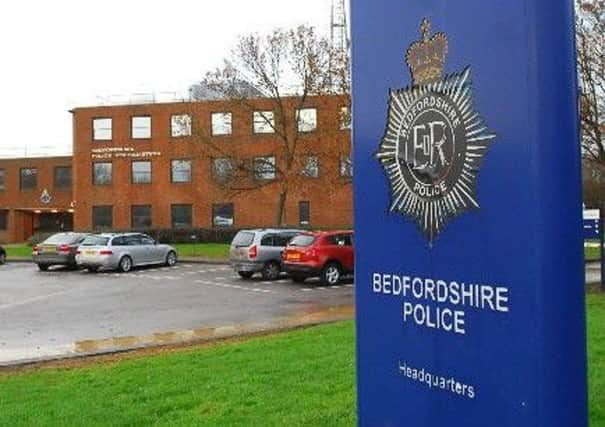Beds Police told to improve staff vetting and counter-corruption, says new report


Bedfordshire Police should improve how it manages the vetting of its officers and staff, according to a new report.
The report into the ‘effectiveness of vetting and counter-corruption arrangements’ also highlighted how well the force tackles potential
corruption, as an area of concern.
Advertisement
Hide AdAdvertisement
Hide AdThe inspection found Beds Police had 706 individuals with expired vetting in February 2019. At the time of the inspection, the force had made some improvement by reducing the number of people who hadn’t been vetted to 247.
In addition, the FVU was dealing with 257 new vetting applications.
The report stated the problem was down to a vetting management IT system which didn’t link to the force’s human resources (HR) system. As a result, it was not possible to automate the notification process between the force vetting unit (FVU) and HR teams for individuals leaving, joining, or moving within the organisation.
Consequently this had to be done manually, creating the potential for the vetting team to be unaware of the movement of personnel within the force and the HR team to be unaware of individuals’ vetting clearance. The inspection found that HR keeps the FVU updated about demands rising out of the Police Uplift Programme.
Advertisement
Hide AdAdvertisement
Hide AdThe report stated vetting at the enhanced clearance level was also not being managed effectively. It was difficult to identify people in designated posts who had or didn’t have the correct vetting, and the force provided contradictory data.
The report concluded: “The force should improve how it manages the vetting of its workforce, to make sure that post holders have valid vetting clearance for the role undertaken.
“The force should further develop its system to monitor and respond to disproportionality in its vetting decisions.”
It further added: “While the force had previously shown some progress in meeting recommendations, it still needed to improve the management of its vetting and accordingly this as an area for improvement.”
Advertisement
Hide AdAdvertisement
Hide AdThe inspection further looked at how effectively the force protected information and data it holds and how well it tackled potential corruption.
It found the force correctly categorised all 62 items of corruption intelligence reviewed in line with the national Authorised Professional Practice on counter-corruption (intelligence). But inspectors did not see any examples of proactive intelligence collection and the force was not using its IT monitoring capability to exploit all opportunities.
The force was aware of this and had allocated additional resources to help it become more effective in this area.
It also recognised that abuse of position for a sexual purpose amounted to serious corruption with training mandatory now put in place.
Advertisement
Hide AdAdvertisement
Hide AdThe inspection further found the force recognised the risk associated with the use of encrypted apps on its devices. On 1 September 2021, it removed the right to use these apps and prohibited the use of work mobiles for personal matters.
During a review of 62 items of potential corruption intelligence, the inspection found an effective use of the IT monitoring software.
The report was carried out by His Majesty’s Inspectorate of Constabulary and Fire & Rescue Services (HMICFRS).
Acting Chief Constable Trevor Rodenhurst from Bedfordshire Police said the vetting process plays a major part in identifying anyone who falls short of the highest standards of conduct and integrity, particularly with regards to racism and misogyny and says they are areas he is determined to root out of the organisation.
Advertisement
Hide AdAdvertisement
Hide Ad“This report outlines the progress we have made in recent years, such as significantly reducing the number of staff members with expired vetting since the previous inspection,” Acting Chief Constable Rodenhurst said.
"We continue to invest money and resources into this important function including a new specialist regional counter corruption capability, as well as overhauling our wider Professional Standards Department to embed the national police race action plan and introduce an independent scrutiny panel to ensure diversity and transparency in decision making."
Beds Police also provided some background on the dedicated vetting team set up to ensure procedures for new recruits and re-vetting of all officers are fully compliant:
The Bedfordshire, Cambridgeshire and Hertfordshire Professional Standards department has a dedicated vetting team who ensure procedures for vetting new recruits and re-vetting all officers and staff are fully compliant with the College of Policing’s approved processes.
Advertisement
Hide AdAdvertisement
Hide AdThe inspection confirmed its processes are fully compliant both for new recruits and for existing employees, including additional checks made on those who transfer from other forces
Vetting is a core part of the recruitment process and includes in depth checks on all of the information available to the team at the point of application. This includes checks on family and co-dependants.
The team also work closely with the Eastern Regional Special Operations Unit (ERSOU) and neighbouring forces, sharing information where reportable associations are of concern. A re-vetting programme is also in place for all officers and staff throughout their employment with the forces.
The vetting department has been proactive in anticipating future demand, including that which will come from the police recruitment uplift programme, and have been provided with additional resources from the three Chief Constables and PCCs to ensure an effective and efficient vetting service. A dedicated manager is also in place to review all appeals to ensure consistency in decision making.